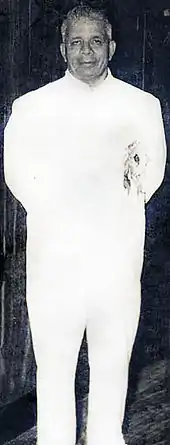Dayanand Bandodkar | |
|---|---|
 | |
| 1st Chief Minister of Goa, Daman and Diu | |
| In office 20 December 1963 – 2 December 1966 | |
| Preceded by | Office established |
| Succeeded by | President's rule |
| In office 5 April 1967 – 23 March 1972 | |
| Preceded by | President's rule |
| Succeeded by | Himself |
| In office 23 March 1972 – 12 August 1973 | |
| Preceded by | Himself |
| Succeeded by | Shashikala Kakodkar |
| Member of Goa, Daman and Diu Legislative Assembly | |
| In office 31 December 1964 – 1972 | |
| Preceded by | Vasant Velingkar |
| Succeeded by | Krishna Bandodkar |
| Constituency | Marcaim |
| In office 1972 – 12 August 1973 | |
| Preceded by | Anthony D'Souza |
| Succeeded by | Ramakant Khalap |
| Constituency | Mandrem |
| Personal details | |
| Born | Dayanand Balkrishna Bandodkar 12 March 1911 Pernem, Goa, Portuguese India, Portuguese Empire (now in India) |
| Died | 12 August 1973 (aged 62) Panaji, Goa, India |
| Political party | Maharashtrawadi Gomantak Party (1963–1973) |
| Children | 5, including Shashikala Kakodkar |
| Occupation | Politician |
| Nickname | Bhausaheb Bandodkar |
Dayanand Balkrishna Bandodkar (12 March 1911 – 12 August 1973), popularly known as Bhausaheb Bandodkar[1] was the first Chief Minister of Goa, in the territory of Goa, Daman and Diu. Born in Pernem to a Marathi family who had immigrated from Tuljapur,[2][3] he became a wealthy mine owner following the Annexation of Goa. He sought to merge the territory with the state of Maharashtra. He swept the polls in 1963, 1967 and in 1972 while representing the Maharashtrawadi Gomantak Party (MGP)[4] and remained in power until his death in 1973.[5]
Bandodkar was a member of the Gomantak Maratha Samaj in Goa).[6] His proposal to merge Goa with Maharashtra was met with stiff opposition from the native Goans. Indira Gandhi, the then Prime Minister of India then offered him two options:[7]
- To retain Goa's current status as a Union Territory
- To merge Goa into the neighboring state of Maharashtra and the other erstwhile Portuguese enclaves of Daman and Diu into the neighbouring state of Gujarat
A law to conduct a referendum to decide the issue of merger or otherwise of Goa, Daman and Diu with Maharashtra/Gujarat was passed by both the houses of the Indian Parliament, the Lok Sabha (on 1 December 1966), and the Rajya Sabha (on 7 December 1966 and the same received the assent of the President of India, Sarvepalli Radhakrishnan on 16 December 1966. An opinion poll was subsequently held on 16 January 1967 to decide the fate of the union territory which voted to retain its separate status by 34,021 votes.[8]
Death
Bandodkar died in office on 12 August 1973 at age 62 and was succeeded by his daughter Shashikala Kakodkar. Three years after his death his son married the actress Leena Chandavarkar. He died at the age of 25 years on 7 November 1976.[9]
See also
References
- ↑ "Parrikar pays tributes to Bhausaheb Bandodkar". United News of India. 12 August 2018.
- ↑ Karnik, D. B. (1994). Goa's Man of Destiny. pp. 3–4.
- ↑ N, Radhakrishnan (1994). "Dayanand Balkrishna Bandodkar: The Architect of Modern Goa" (PDF). PhD Thesis. Goa University.
Dayanand Bandodkar's family was a migrated one. Their family Goddess is the famous Bhavani of Tuljapur in Maharashtra. Dayanand Bandodkar once narrated how the family came from Tuljapur and settled down in Bandiwade in Goa where a portion of the land is known as Bokadwag where they lived. Commercial interest of his father Balkrishna Bandodkar prompted them later to shift to Mapusa in North Goa.
- ↑ "Remembering Dayanand Bandodkar - first CM of Goa". 12 August 2016. Retrieved 12 December 2018.
- ↑ "Assemblywise Chief Ministers of Goa". Goa News. 20 January 2003. Archived from the original on 7 November 2006. Retrieved 14 January 2007.
- ↑ Goa world book review Archived 5 January 2009 at the Wayback Machine
- ↑ "History of Goa". Goa Central. Archived from the original on 11 January 2007. Retrieved 14 January 2007.
- ↑ Pereira, Aaron (18 January 2019). "What is Goa's 'Opinion Poll Day'?". Indian Express.
- ↑ "Target Goa: Siddharth Bandodkar passed away too soon". Archived from the original on 22 April 2015. Retrieved 22 April 2015.